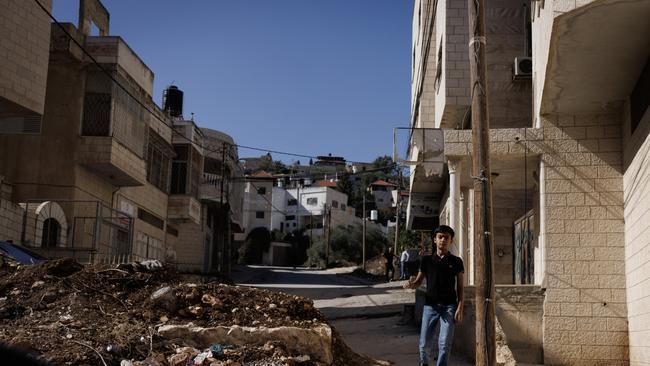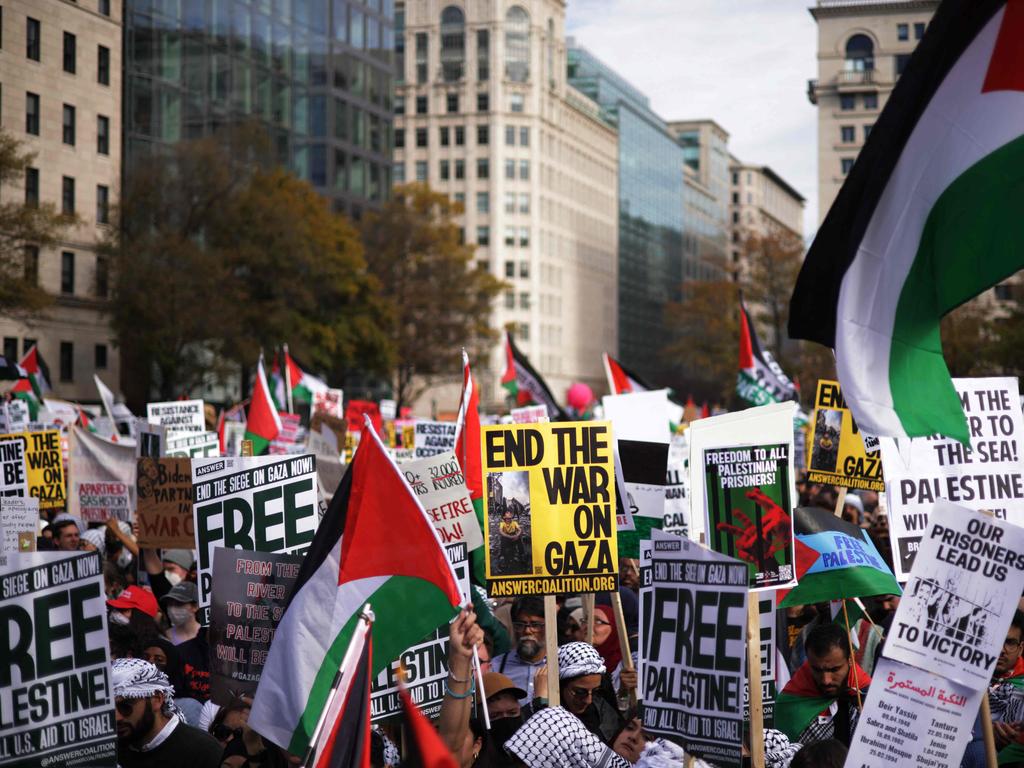
As the images flooded in of horrors beyond forgetting and beyond forgiving, Australia too reeled in shock. This was not the worst, which we have learned to expect; this was the unthinkable.
But nothing fades more quickly than outrage about dead Jews. And now, far from making any respite in the war conditional on the immediate release of Hamas’s hostages and the transfer of the murderers to Israel for trial, Hamas’s enablers, ranging from lawyers to parliamentarians, claim it is Israel that has flouted international law.
Those accusations are not only blatantly hypocritical; they wilfully misrepresent the laws of armed conflict.
Thus, as article 51 of the UN charter recognises, all states have an inherent right to self-defence. That right does not merely allow the immediate act of aggression to be neutralised; it encompasses the actions needed to prevent likely future attacks, both by degrading the adversary’s military capabilities and by credibly deterring it from using any capabilities it has left.
In pursuing those objectives, states are fully entitled to seek the aggressor’s defeat as quickly and efficiently as possible, including through the use of overwhelming force and by means of sieges and blockades, even if their incidental effect is harm to civilians.
States must, of course, respect, as best they can, the “principle of humanity” – which “forbids the infliction of injury that is not necessary to accomplish a legitimate military purpose” – and the “principle of distinction”, which requires the “parties to a conflict to distinguish between the armed forces and the civilian population”.
But respecting those principles is not a question of limiting the response to “tit for tat”, as might be the case in a mere reprisal. Rather, actions taken in self-defence are “proportional”, and hence lawful, if the foreseeable harm to civilians is reasonably likely to be outweighed by their cumulative contribution to a legitimate military objective, which in this case is the destruction of Hamas’s ability to continue its campaign of terror.
That immense difficulties are involved in carrying out those assessments amid the fog and urgency of war is obvious.
Recognising those difficulties, international law does not expect commanders to have perfect information: even less does it require them to implement all the precautions that might conceivably avoid civilian casualties.
Instead, “the standard for what precautions must be taken”, explains the US Department of Defence’s comprehensive guide to the law of armed conflict, “is one of due regard or diligence, not an absolute requirement to do everything possible”.
And as the German Federal Court confirmed in its widely cited 2010 Fuel Tankers decision, “the laws of armed conflict are only infringed (when) the commander ignored any considerations of proportionality and refrained from acting honestly, reasonably and competently”.
Similar considerations apply to humanitarian relief. There is, under the principle of humanity, an obligation to allow the supply to civilians of food, medicine and clothing. However, that obligation is qualified by “imperative reasons of security”, including the risk of supplies being diverted to enemy forces.
States consequently have a long-established right to impose restrictions on relief operations, as they do on neutral shipping, including by requiring the screening of the goods being supplied and limiting their distribution to agencies that have proven to be truly impartial. When those conditions are not met, as both Israel and Egypt believed was the case in Gaza, they may entirely legitimately prevent relief operations from proceeding.

But international law does not only shape the rights and duties of the party acting in self-defence: it imposes even more stringent obligations, which Hamas’s apologists unfailingly ignore, on the conduct of hostilities by its adversary.
It is, in effect, clearly accepted under customary international law, and explicitly reaffirmed in the 1977 Geneva Additional Protocols, that the primary responsibility for protecting civilians rests with the party that controls the territory in which they are located; that is, Hamas.
That party has an obligation to encourage and facilitate the evacuation of civilians from combat zones; it is also absolutely prohibited from using those civilians, much less any hostages it has seized, as human shields.
And exploiting what would normally be regarded as civilian facilities for (or to conceal) military activities is strictly prohibited too, since any facility that makes “an effective contribution to military action” immediately becomes a legitimate military target, so long as its “total or partial destruction, capture or neutralisation offers a definite military advantage” (where “definite” simply means “not merely hypothetical or speculative”).
Moreover, the initial aggressor bears the legal responsibility for any civilian casualties its infringement of those provisions causes and acquires no legal rights of complaint or recourse when those casualties eventuate – since allowing it to claim such rights would, as the US guide notes, be “flatly contrary to the principle (that) legal rights should not result from the commission of wrongful acts”.
Nor can that party expect its human shields to protect it, through the proportionality test, from legitimate attack; on the contrary, says Britain’s Manual of the Law of Armed Conflict, if the aggressor has deliberately “put civilians … at risk by placing military objectives in their midst, this is a factor in favour of the legality (under international law) of attacks on those objectives”.
That Hamas has breached each and every one of its obligations, not least to the people of Gaza, is beyond question. That it will do absolutely nothing to punish its appalling violations of international law is equally certain.
Nothing would be easier than for Israel to use Hamas’s callous disregard of the law of armed conflict to qualify its own obligations. It hasn’t and it won’t. That isn’t because it fears the consequences: Israel has long learned to rely on itself and itself alone. It is because it would not be in its character.
The contrast could not be starker. Israel systematically warns civilians in areas that are likely to be under attack, despite the risk that poses to its troops. Hamas slaughters children in their sleep.
To say that is not to suggest Israel is incapable of making mistakes: states, in this world of ours, are not saints. But unlike Hamas’s murderers, the perpetrators of any breaches will face a powerful, vigorously independent judiciary that enforces the law of armed conflict as part of domestic law. Even more importantly, they will face a body of citizens that remains as intensely committed as it has ever been to Israel’s abiding values, including the rule of law.
That, in the end, is the fundamental difference between barbarism and civilisation: between those who know no law and those who live by the biblical command to “follow justice and justice alone”. And that is why this Remembrance Day, as we honour those who died so that justice may live, the dead Jews of October 7 are, and must remain, our dead too.








Four weeks ago, Israelis woke up to scenes of unimaginable barbarism: children forced to watch as their parents’ eyes were gouged out, after which they and their parents were murdered; babies, toddlers and adults decapitated; innocent civilians raped and butchered.